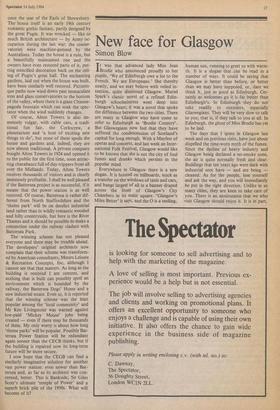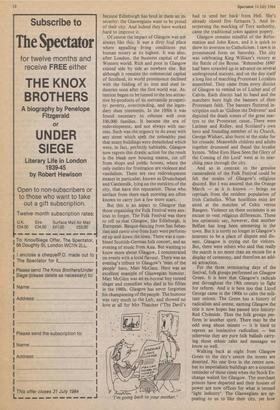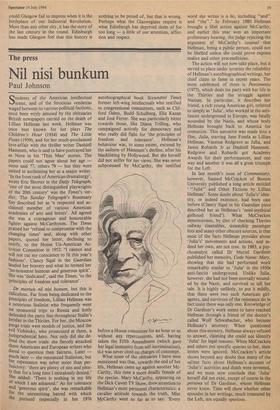New face for Glasgow
Simon Blow
Iwas that advanced lady Miss Jean 'Brodie who announced proudly to her pupils, 'We of Edinburgh owe a lot to the French. We are Europeans.' She thereby neatly, and we may believe with veiled in- tention, quite dismissed Glasgow. Muriel Spark's classic novel of a refined Edin- burgh schoolmistress went deep into Glasgow's heart; it was a novel that spoke the difference between the two cities. There are many in Glasgow who have come to refer to Edinburgh as 'Brodie Country'. But Glaswegians now feel that they have suffered the condescension of Scotland's capital for long enough. With a Mayfest of operas and concerts, and last week an Inter- national Folk Festival, Glasgow would like to be known that she is not the city of foul fumes and drunks which persists in the popular mind.
Everywhere in Glasgow there is a new slogan. It is hoisted on billboards, stuck as a transfer on the windows of taxis and cars, and hangs largest of all in a banner draped across the front of Glasgow's City Chambers in its main square. 'Glasgow's Miles Better' it says, and the 0 is a smiling, human sun, running to greet us with warm- th. It is a slogan that can be read in a number of ways. It could be saying that Glasgow is better than before, or better than we may have supposed, or, dare we think it, just as good as Edinburgh. Cer- tainly as welcomes go it is far better than Edinburgh's. In Edinburgh they do not take readily to outsiders, especially Glaswegians. They will be very slow to talk to you; that is, if they talk to you at all. In Edinburgh, the ghost of Miss Brodie has yet to be laid.
The days that I spent in Glasgow last week and on previous visits, have just about dispelled the time-worn myth of the fumes. Since the decline of heavy industry and Glasgow being declared a no-smoke zone, the air is quite normally fresh and clear. Buildings that ten years ago were dark with industrial soot have — and are being cleaned. As for the people, lose yourself and ask the way, and you will immediately be put in the right direction. Unlike in so many cities, they are keen to take care of you. There is an anxiousness that we who visit Glasgow should enjoy it. It is in part, because Edinburgh has bred in them an in- security: the Glaswegians want to be proud of their city. And indeed they have worked hard to improve it.
Of course the impact of Glasgow was not always like this. It was a dirty foul place where appalling living conditions put human misery at its highest. It was also, after London, the business capital of the Western world. Rich and poor in Glasgow existed side by side as nowhere else. But although it remains the commercial capital of Scotland, its world prominence declined with the folding of its iron and steel in- dustries soon after the first world war. At- tention began to be turned to the less attrac- tive by-products of its mercantile prosperi- ty: poverty, overcrowding, and the legen- dary slum tenements. In the 1950s it was found necessary to rehouse well over 100,000 families. It became the era of redevelopment, and not always with suc- cess. Such was the urgency to do away with any street which spelt the unhealthy past that many buildings were demolished which were, in fact, perfectly habitable. Glasgow now regrets this drastic action for the result is the bleak new housing estates, cut off from shops and public houses, where the only outlets for frustration are violence and vandalism. There are two redevelopment estates in particular, known as Drumchapel. and Castlemilk, lying on the outskirts of the city, that have this reputation. Those who surface from there each morning are often known to carry just a few more scars.
But this is an aspect to Glasgow that those organising the Folk Festival were anx- ious to forget. The Folk Festival was there to tell us that Glasgow, like Edinburgh, is European. Basque dancing from San Sebas- tian and canto vivo from Italy were perform- ed up and down the town. There was a com- bined Scottish-German folk concert, and an evening of music from Asia. But wanting to know more about Glasgow, I concentrated on events with a local flavour. There was an evening's tribute to Glasgow's 'man of the people' hero, Matt McGinn. Here was an excellent example of Glaswegian humour. Matt McGinn was an ex-borstal boy turned singer and comedian who died in his fifties in the 1960s. Glasgow has never forgotten his championing of the people. The humour was very much to the Left, and showed no love at all for Mrs Thatcher (`The Devil's `I'm going back to your mother.' had to send her back from Hell. She's already closed five furnaces.'). And in- terpersing the mocking of Tory authority, came the traditional jokes against popery.
Glasgow remains mindful of the Refor- mation and John Knox, and it is quick to show its aversion to Catholicism. I saw it in pronounced form on Saturday. The city was celebrating King William's victory at the Battle of the Boyne. `Retnember 1690' had been scrawled up in advance on several underground stations, and on the day itself a long line of marching Protestant Loyalists assembled. They came from every district of Glasgow to remind us of Luther and of Calvin. Each district had its band and the marchers bore high the banners of their Protestant faith. The banners fluttered in- scription such as 'Gideon the Deliverer' and depicted the death scenes of the great mar- tyrs to the Protestant cause. There were Latimer and Ridley, and Scotland's own hero and founding member of its Church, George Wishart, also burnt at the stake for his crusade. Meanwhile children and adults together drummed and fluted the loyalist hymns. 'Mine Eyes Have Seen the Glory of the Coming of the Lord' went at its mar- ching pace through the city.
And so in contrast to the genuine camaraderie of the Folk Festival could be felt the strains of Glasgow's religious discord. But I was assured that the Orange March — as it is known — brings no reprisals from the resident population of Irish Catholics. What hostilities exist are aired at the matches of Celtic versus Rangers. Violence on these occasions is an excuse to vent religious differences. Those less optimistic say, however, that another Belfast has long been simmering in the town. But it is surely no longer in Glasgow's interests to be a place of dispute and dis- sent. Glasgow is crying out for visitors. But, there were others who said that really the march is no more than an excuse for a display of ceremony, and therefore an add- ed attraction.
For the three terminating days of the festival, folk groups performed on Glasgow Green. It is here that Glasgow's radicals met throughout the 19th century to fight for reform. And it is here too that Lloyd George came in the 1900s to calm the mili- tant unions. The Green has a history of radicalism and unrest, earning Glasgow the title it now hopes has passed into history: Red Clydeside. Thus the folk groups per- form in another spirit. There may be the odd song about miners — it is hard to repress an instinctive radicalism — but otherwise they are pure folk ballads carry- ing those ethnic .tales and messages we know so well.
Walking back at night from Glasgow Green to the city's centre the streets are deserted. No one lives in the centre now, but its imperialistic buildings are a constant reminder of those times when the Stock Ex- change waited for Glasgow. The merchant princes have departed and their houses of power are now offices for what is termed `light industry'. The Glaswegians are ap- pealing to us to like their city, yet how could Glasgow fail to impress when it is the birthplace of our Industrial Revolution. More than any other city, it has the story of the last century in the round. Edinburgh has made Glasgow feel that this history is nothing to be proud of, but that is wrong. Perhaps what the Glaswegians require is what Edinburgh has deprived them of for too long — a little of our attention, affec- tion and respect.
















































 Previous page
Previous page